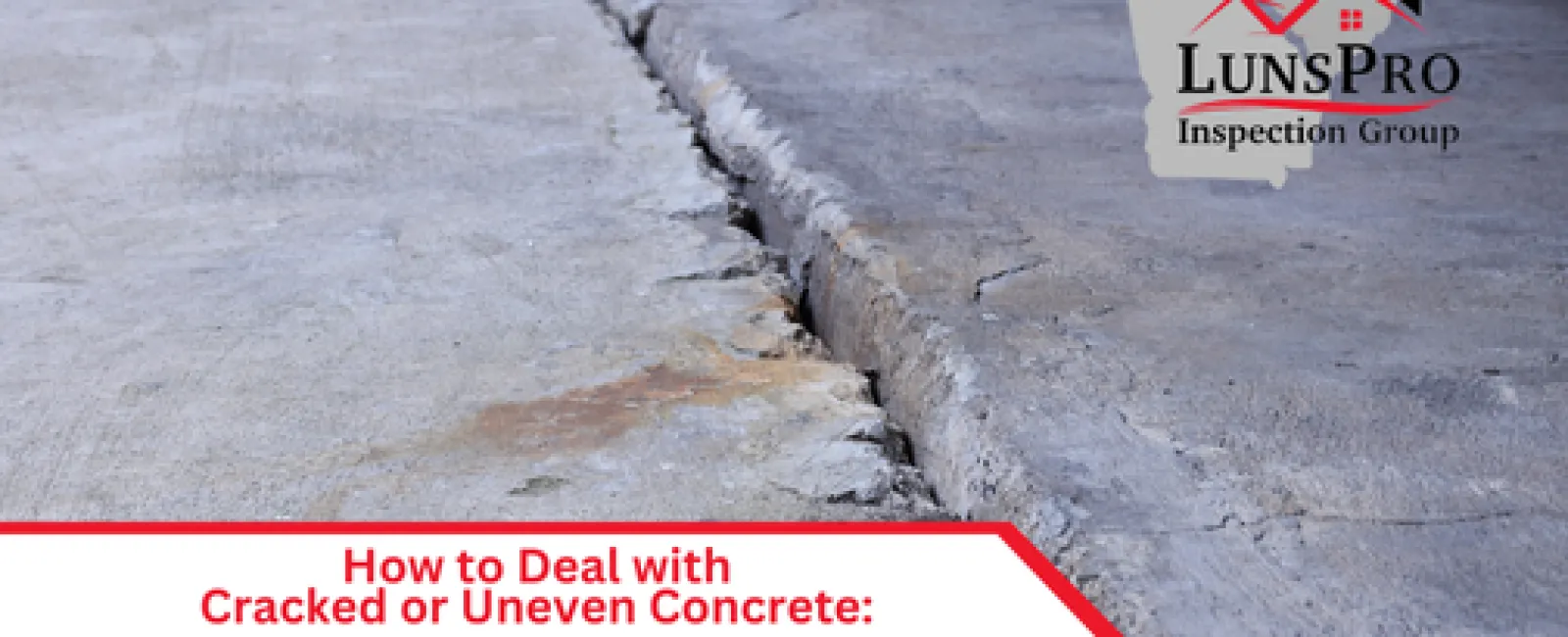Concrete is a fundamental building material widely used for everything from driveways and sidewalks to home foundations and commercial structures. However, despite its durability, concrete is not immune to cracking or settling over time. Cracked or uneven concrete can lead to a host of problems, including safety hazards, aesthetic issues, and even structural damage if left unaddressed. For homeowners and commercial property owners in Carolina, understanding how to manage concrete issues is essential to preserving both property value and safety.
When dealing with cracked or uneven concrete, it's critical to assess the root cause of the problem. Factors like soil conditions, weather, and age can all contribute to concrete deterioration, and identifying these causes can help in determining the appropriate repair method. At LunsPro Inspection Group, our Carolina residential and commercial inspections team is equipped with specialized skills, including Carolina concrete inspections and even Carolina drone inspections, to uncover these issues in both visible and hard-to-reach areas.
In this guide, we'll explore common causes of cracked or uneven concrete, the impact on property, and various methods of repair and prevention. By following these insights and enlisting the help of experts like LunsPro Inspection Group, property owners can ensure their concrete remains safe, stable, and visually appealing for years to come.
Common Causes of Cracked or Uneven Concrete
Understanding the reasons behind concrete damage is the first step toward effective repair and prevention. Several factors contribute to concrete cracks and unevenness, and they often interact in ways that accelerate deterioration.
1. Soil Settlement and Shifting
- Soil movement is a major cause of concrete damage. Over time, the ground beneath concrete slabs can shift or settle due to factors such as erosion, water flow, or nearby construction. This creates voids beneath the slab, leading to sinking or cracking. Areas with expansive clay soils are particularly susceptible to this type of damage.
- Impact on Carolina Properties: Carolina properties often deal with soil expansion and contraction due to the region's seasonal weather patterns, making concrete inspections essential for spotting early signs of settling issues.
2. Tree Roots
- Tree roots can exert substantial pressure on concrete surfaces, leading to cracks or lifting. Trees planted too close to concrete slabs can also cause shifting, as the roots spread and disrupt the stability of the soil.
- Recommendation: For properties with significant landscaping, routine Carolina concrete inspections can help identify potential risks from nearby tree roots before they cause extensive damage.
3. Water Infiltration and Freeze-Thaw Cycles
- Water is a major contributor to concrete deterioration. Water can seep into small cracks, and when temperatures drop, it expands, widening the cracks in a process known as freeze-thaw damage. Over time, this can lead to extensive damage and even compromise structural integrity.
- Regional Considerations: In areas like Carolina, where winter freeze-thaw cycles are common, regular inspections and timely repairs can prevent major damage. Drone inspections, especially, can be beneficial in assessing hard-to-reach or elevated concrete surfaces for water infiltration issues.
4. Improper Installation and Curing
- Poor installation practices, such as incorrect water-to-cement ratios or insufficient curing time, can lead to weakened concrete. This type of concrete is more prone to cracking under pressure or during extreme weather conditions.
- Importance of Professional Assessments: Ensuring concrete installations are done correctly from the start is crucial. Property owners who suspect installation issues may benefit from Carolina residential and commercial inspections provided by experts like LunsPro Inspection Group.
Inspection Techniques for Cracked or Uneven Concrete
Effective inspection is key to identifying the severity and source of concrete issues. At LunsPro Inspection Group, we use a combination of visual inspections, specialized equipment, and advanced techniques to assess concrete damage in Carolina properties.
1. Visual Inspections
- Visual inspections are the first step in identifying surface-level cracks, discoloration, and unevenness. Inspectors look for patterns in cracking that may indicate underlying issues, such as settlement cracks or expansion cracks.
- Detailed Concrete Findings: Visual inspections provide initial concrete findings that help guide further investigation and recommendations for repair.
2. Drone Inspections
- For elevated or hard-to-reach concrete areas, drone inspections are invaluable. Drones can capture detailed images and video footage of rooftops, high walls, and other elevated concrete structures, enabling inspectors to assess potential damage without the need for scaffolding or ladders.
- Carolina Drone Inspections: LunsPro Inspection Group's Carolina drone inspections are especially useful for commercial properties or multi-story buildings, where thorough evaluations of concrete are essential for safety and maintenance.
3. Advanced Diagnostic Tools
- Technologies like infrared thermography, ground-penetrating radar, and moisture meters are used to identify subsurface issues, such as voids, moisture buildup, or weak points within the concrete. These tools provide a more comprehensive understanding of concrete health beyond surface-level findings.
Methods for Repairing Cracked or Uneven Concrete
Once concrete damage has been identified, choosing the right repair method is critical to ensure long-lasting results. Repair options vary depending on the severity and location of the damage.
1. Patching and Resurfacing
- When to Use: Small surface cracks or areas with minor spalling can often be repaired with patching compounds or resurfacing treatments. These methods improve the appearance of concrete while preventing further deterioration.
- Process: A bonding agent is applied to help the patch adhere, and then a resurfacing material is added to create a smooth finish.
- Limitations: This method is ideal for minor damage but may not be suitable for extensive or deep cracks that indicate structural problems.
2. Concrete Leveling and Mudjacking
- When to Use: For sunken or uneven concrete slabs, leveling methods like mudjacking can be effective. Mudjacking involves pumping a mixture of water, soil, and cement under the slab to lift it back into place.
- Carolina Properties: Concrete leveling is a popular choice for driveways, sidewalks, and garage floors where uneven slabs pose a tripping hazard. Regular Carolina concrete inspections can help determine when leveling is necessary to restore functionality and appearance.
3. Crack Injection
- When to Use: For structural cracks that go beyond the surface, crack injection with epoxy or polyurethane resin can be an effective solution. This method seals the crack and reinforces the concrete, preventing further spreading.
- Durability: Crack injection provides long-lasting results, especially when applied by professionals who understand the intricacies of concrete repair.
4. Concrete Replacement
- When to Use: In cases of extensive damage, full replacement may be the only viable solution. Replacement is often necessary when the concrete's structural integrity is compromised, such as in the case of deep structural cracks or severe settlement.
- Considerations: Although more costly than repair methods, replacement offers a fresh start and is often the best option for areas with substantial wear and tear.
Preventative Measures for Concrete Maintenance
Preventative maintenance is essential for extending the life of concrete and minimizing repair costs. Here are some strategies that property owners can implement to keep their concrete in good condition.
1. Regular Sealing
- Benefits of Sealing: Applying a sealant protects concrete surfaces from water infiltration, stains, and chemical exposure. Sealing is especially important in climates with frequent rainfall or freeze-thaw cycles, as it reduces the risk of cracking and spalling.
- Frequency: Generally, concrete should be resealed every 1-3 years, depending on the amount of wear it endures.
2. Proper Drainage Solutions
- Water Management: Ensuring water drains away from concrete surfaces prevents erosion of the underlying soil and reduces the risk of freeze-thaw damage. Installing gutters, downspouts, and grading the ground away from concrete surfaces are effective ways to manage water flow.
- Inspection Importance: During Carolina residential and commercial inspections, professionals can assess drainage systems to ensure they're adequately protecting concrete surfaces.
3. Routine Inspections
- Benefits of Regular Checks: Scheduling regular concrete inspections, especially for commercial properties, helps identify minor issues before they escalate. By catching cracks or settlement early, property owners can avoid costly repairs.
- LunsPro's Role: With LunsPro Inspection Group's experience in Carolina concrete inspections and concrete findings, property owners can maintain their concrete effectively and make informed decisions about repair and maintenance.
Concrete is a durable material, but it requires attention and maintenance to prevent cracking and unevenness. By understanding the causes and inspection techniques, property owners can proactively address issues and prevent them from escalating. LunsPro Inspection Group, with its specialized Carolina residential and commercial inspections, offers comprehensive Carolina concrete inspections, including drone inspections for hard-to-reach areas, ensuring every aspect of concrete health is thoroughly assessed.
Property owners in Carolina should be vigilant about routine maintenance, including regular sealing, managing drainage, and scheduling periodic inspections. By partnering with experts like LunsPro, who provide in-depth concrete findings and repair recommendations, owners can enjoy peace of mind knowing that their properties remain safe, functional, and visually appealing.
A proactive approach to concrete care, combined with professional insights from LunsPro Inspection Group, will protect Carolina properties for years to come. Embracing preventative measures and understanding the various repair options available ensures that cracked or uneven concrete doesn't compromise safety or value, setting a solid foundation for the future.

